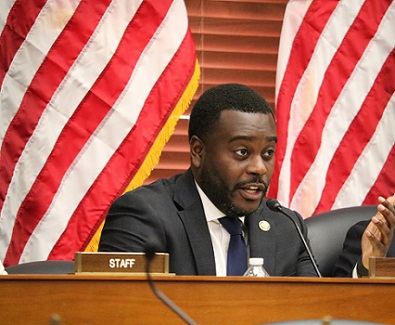Amo highlights R.I.’s blue economy during Subcommittee on Environment hearing
April 1, 2025
PROVIDENCE – The Subcommittee on Environment on the House Committee on Science, Space, and Technology held its first hearing of the year on March 26, during which ranking subcommittee member Gabe Amo, D-R.I., spoke of the importance of the blue economy to the Ocean State.
“Since the days of Roger Williams and the Gaspee Affair, the ocean has been central to Rhode Island’s identity,” he said. “But water isn’t just a key to our past – it’s critical to our future.”
During his opening remarks of the hearing, which was titled “To the Depths, and Beyond: Examining Blue Economy Technologies,” Amo highlighted “thriving blue industries” in Rhode Island such as commercial fishing, tourism, defense production, shipbuilding, marine manufacturing, offshore wind and oceanic research.
“Leveraging our state’s natural strengths has ushered in a new age of prosperity for workers, small businesses and research institutions,” he said.
Amo said estimates show the blue economy employs more than 36,000 workers in Rhode Island and contributes over $5 billion to the state’s gross domestic product every year.
“Across the country, there are approximately 2 million workers supporting the blue economy who contribute about $373 billion to our nation’s GDP,” he added.
To learn more, Amo said he embarked on a multiday, multi-stop tour in October of blue economy businesses in Rhode Island’s 1st Congressional District, which he represents.
“I learned about leaders training union workers pursuing careers in offshore wind. I engaged with researchers and higher education leaders working to deepen our understanding of the ocean. I saw how cutting-edge manufacturing companies are growing their footprints and investing in our communities,” Amo said. “Tools like artificial intelligence and robotics are revolutionizing ocean-based industries and driving growth in the blue economy. Rhode Island has companies utilizing cutting-edge aquatic data collected through underwater drones that is increasing our national defense capabilities.”
Amo said investment in the blue economy must continue.
“It supports innovation, our workforce and our resiliency efforts,” he said. “It’s about protecting our global innovation leadership. We need public, private and nonprofit stakeholders rowing in the same direction.”
While Amo said he hopes the subcommittee shares the values of “leveraging our ocean to advance scientific research, spur economic development and defend our national security,” he’s not certain that “the leadership at 1600 Pennsylvania Avenue at the White House” shares the same priorities.
“Time and time again, we have seen President Trump, and his billionaire supporters, stand in the way. They have systematically undermined and jeopardized our progress in an area where we should continue to have great leadership,” he said.
Amo listed as examples “the whiplash firing and rehiring of staff, the canceling of contracts and the freezing of grants across our government,” including at the National Oceanic and Atmospheric Administration and the National Science Foundation.
“Hacking and slashing away at our federal agencies slows scientific progress that is urgently needed, threatens economic stability, undermines disaster preparedness, and can hinder national security,” he said.
Amo said innovation has always been a collaborative effort between government, academia, nonprofits and the private industry, driving “foundational ‘moonshot’ innovations” and turning “breakthroughs into real-world applications” and rapidly scaling them with the help of private-public partnerships.
“However, Trump and DOGE [Department of Government Efficiency] and the actions of the last several weeks have worked overtime to turn back the clock,” he said.
Amo said crippling federal support for research at universities and the private sector is dimming the prospects for future scientific discovery, while cutting off pathways and opportunities that lead to careers in science and innovation.
“The actions of President Trump have driven universities to lay off staff, issue new guidance for graduate students and push away the very expertise that we urgently need now to continue our advances in the blue economy,” he said. “Researchers are left scrambling. Organizations are being forced into crisis mode and students are dissuaded from pursuing careers in STEM [science, engineering, technology and math].”
Amo said these funding cuts “are threatening America’s already tenuous global leadership” in ocean research and innovation.
“What does it mean when the United States, a nation struggling to stay at the forefront of science, is unilaterally disarming and letting our strongest scientific tools wither on the vine?” he said. “I hope we can find a bipartisan consensus to push back against these decisions. Because if not, there will come a point where recovery may no longer be possible.”
Christopher Allen is a PBN staff writer. You may contact him at Allen@PBN.com.
Search
RECENT PRESS RELEASES
Related Post





